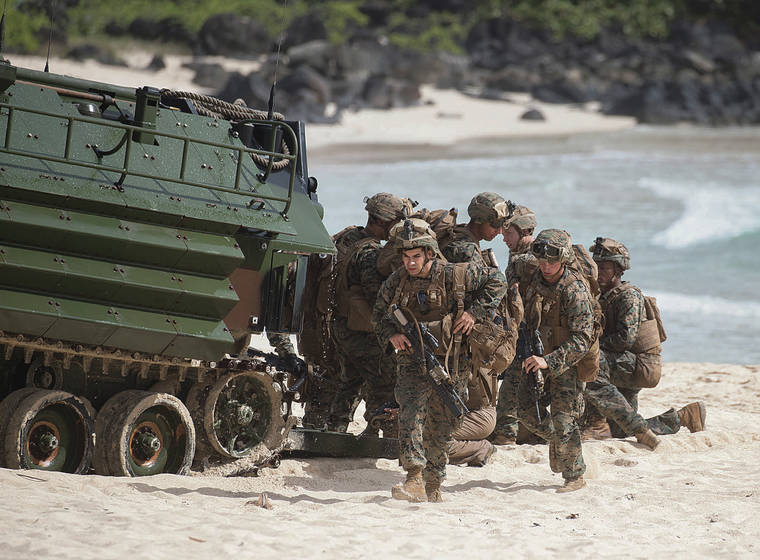Column: This is no time for RIMPAC exercises amid the coronavirus pandemic

CINDY ELLEN RUSSELL / CRUSSELL@STARADVERTISER.COM
In 2018, armed forces from Australia, Chile, Indonesia, Japan, the Republic of the Philippines, the Republic of Korea and the United States participated in an amphibious landing exercise at Marine Corps Base Hawaii in Kaneohe as part of Rim of the Pacific (RIMPAC) exercises.
In light of the implementation of the statewide 14-day quarantine Opens in a new tab for visitors and returning residents, we are dismayed that the U.S. military is currently proceeding with plans to hold the Rim of the Pacific Exercise (RIMPAC) in Hawaii this summer. Hosted every two years here by the Pacific Fleet, RIMPAC is touted as the largest international military exercise in the world.
The 2018 RIMPAC brought 47 surface ships, five submarines, more than 200 aircrafts, and 25,000 military personnel from 25 countries to Hawaii’s lands and waters.
As the pandemic intensifies, militaries have canceled or scaled back joint exercises in Europe, the Middle East, Africa and the Asia-Pacific region. With 227 recorded cases of the coronavirus within the U.S. military’s ranks, an order on Wednesday froze the movements of U.S. troops abroad for 60 days. Yet RIMPAC is still slated to take place, putting Hawaii at risk. Bringing foreign military to the islands during this time of crisis, many from places where the outbreak may be peaking, may have lethal impacts on our island community.
A rich history of activism has confronted RIMPAC’s destruction. From 1980 to 1990, the Protect Kaho‘olawe ʻOhana and the Nuclear Free and Independent Pacific protested the bombardment of Kahoolawe during RIMPAC exercises. In 2018, RIMPAC live-fire training ignited a brushfire at Pohakuloa, at the base of Mauna Kea, that burned 2,000 acres.
Every two years, RIMPAC has destroyed our island resources while naturalizing the imperial violence that underlines these encounters.
Masking this destruction, a RIMPAC spokesperson has touted the economic activity brought by troops. In 2018, some crews enjoyed as many as 12 days for recreation, putting them in daily interaction with civilians. Amid the COVID-19 pandemic, RIMPAC’s merging of militarism and tourism would undermine measures to stop the spread of the virus and put the people of Hawaii in harm’s way.
Don't miss out on what's happening!
Stay in touch with breaking news, as it happens, conveniently in your email inbox. It's FREE!
This crisis reveals the hidden costs of our economic dependence on militarism and tourism, and presents an opportunity to reimagine and create more sustainable alternatives. While some argue that military presence on the islands provides economic benefits, such measurements do not take into account its detriments.
For example, they fail to address the corroding Red Hill fuel tanks at risk of contaminating Oahu’s aquifer that brings water to most of our island’s taps, the military cost-of-living allowances that inflate the housing market, the destruction of cultural sites, the enclosure of hunting and hiking grounds used by locals, the unexploded ordnances that dot our landscape, and the ongoing history of displacement and occupation in Hawaii.
The Department of Defense Office of Economic Adjustment argues that military reduction can open pathways for abundant possibilities and that base closures can in fact contribute to the overall growth and prosperity of entire regions.
We need to seize this moment to scale back military presence on our islands and look to environmentally just alternatives rooted in place-based knowledge that include indigenous practices of abundance and sustainability, community-based agriculture, social housing, youth arts programs, and more.
Bullets and bombs are useless against viruses. This pandemic is revealing that our mutual survival depends on fostering an ethos of solidarity to develop systems that care for all members of our community. Indeed, millions of people around the world are heeding calls for social distancing and changing the way we move through our daily lives so that we may better protect each other. We call upon our lawmakers and the U.S. Pacific Fleet to honor these acts of sacrifice and solidarity by canceling RIMPAC 2020.
Tina Grandinetti is a lecturer in the University of Hawaii’s Political Science Department; Kyle Kajihiro is the former Hawaii program director of the American Friends Service Committee; Laurel Mei-Singh is a UH ethnic studies assistant professor. They wrote this as board members of Hawai‘i Peace and Justice.



